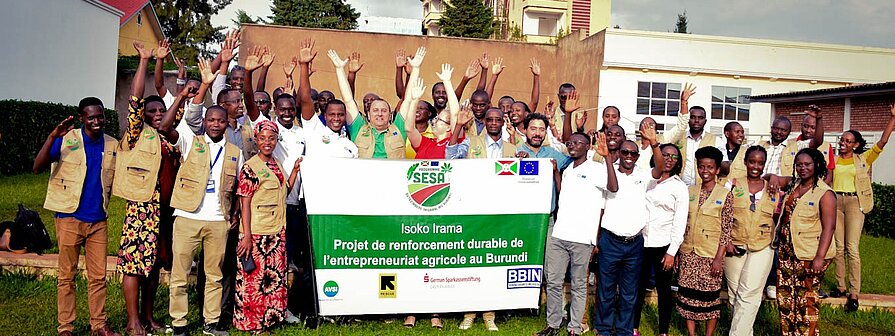Strengthening of Agricultural Entrepreneurs in Burundi
Empowering SMEs in the rural areas through innovative agricultural practices and financial inclusion
With 87% of its population residing in rural areas, Burundi's economy is predominantly agricultural. The project “Soutien à l'Entrepreneuriat du Secteur Agricole au Burundi – SESA Isoko Irama”, funded by the European Union and run by a consortium of 4 organizations namely: AVSI Foundation, Burundi Business Incubator (BBIN), International Rescue Committee (IRC) and German Sparkassenstiftung Eastern Africa (DSIK), aims to improve the economic situation of agricultural producers from vulnerable groups. Operating from October 2023 to September 2027, it covers Ngozi, Kayanza, and Bujumbura provinces, with the potential to expand.
The general objective of the project is to contribute to the strengthening of rural entrepreneurship and the creation of added value and employment in rural areas of Burundi, particularly in the provinces of Kayanza, Ngozi, and Bujumbura. The project focuses on strengthening value chains in the banana, honey, and mushroom sectors. It targets Small and Medium-sized Enterprises (SMEs) and cooperatives working in the value chains above, as well as Village Savings and Loan Associations (VSLAs), production groups, vulnerable groups, and research institutions.
Specifically, this project aims to remove barriers faced by producers in their pursuit of individual and collective growth through four key components:
- Improving the technical aspects of production, processing, and marketing of agricultural products in selected value chains by promoting the development of a green and circular economy
- Developing a comprehensive training and support service for the empowerment and capacity building of entrepreneurs
- Offering accessible and effective cost-shared conditional grants for rural businesses, along with advancing financial inclusion
- Increasing knowledge levels and the adoption of good nutritional practices
DSIK focuses its work in the consortium with the partners on improving access to finance, which explicitly includes the management of a loan fund - provided through the consortium partner AVSI. Beneficiaries are given access to subsidized loan funds, which are accompanied by financial and business education measures. In cases where loan funds are insufficient, partial cost subsidies for investments in income-generating activities can also be made available on a selective basis.


